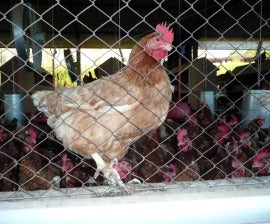
WASHINGTON—From Latin America to Asia, 2018 brought enormous progress towards a global cage-free future for hens in egg production. Humane Society International’s unique approach to farm animal welfare means that we are working with companies on the adoption of cage-free egg procurement policies, and with their suppliers and other stakeholders throughout the supply chain to ensure successful implementation of policies that yield significant animal welfare improvements for millions of animals.
To support those efforts, HSI also works with national governments, financial institutions and intergovernmental bodies to align public policy and animal welfare science to help transition production practices to cage-free.
This year, the cage-free movement continued to expand, with food industry leaders across the globe joining hundreds of other companies that have already committed to going 100 percent cage-free. These commitments reflect the growing global consumer demand for better treatment of animals in the food industry, particularly regarding egg-laying hens, who should be raised in conditions where they can walk, lay eggs in nests, perch and forage, instead of suffering for their entire lives in cages. In response, we saw the egg industry take important steps to meet this growing demand, with more and more producers embracing higher welfare systems for egg-laying hens.
Some of the exciting improvements and advancements that HSI was proud to be a part of in 2018 include:
- In India, a ruling by the High Courts of Delhi and Uttarakhand that directs the government of India, which is the third largest egg producer in the world, to ensure that no new battery-cage facilities are established in the country.
- In Asia, Grand Hyatt Singapore, Andaz Singapore, The Privé Group and Asia’s leading healthy food chain SaladStop!—with locations in nine countries—committed to going cage-free in partnership with HSI, expanding this movement throughout Asia.
- In Brazil, Carrefour, which is the country’s leading food retailer, announced a cage-free egg policy, making it the first supermarket chain in the country to commit to only selling cage-free eggs in all of its stores. Further, dozens of other companies, including Bauduco, Panco, and Casa Suíca, leading baked goods manufacturers in Brazil pledged to go cage-free.
- In Mexico, three more companies announced cage-free egg commitments: Le Pain Quotidien, Grupo Fiesta Foods and Mr. Sushi.
- In Colombia, eight food companies announced cage-free egg policies, including Mesofoods, with 400 operations; Crepes & Waffles, the country’s leading restaurant company; and Colombina, a leading Colombian food manufacturer. Servihoteles, a leading food service provider, also partnered with HSI to switch to a 100 percent cage-free egg supply chain.
- In Argentina, Havanna, one of the largest coffee and baked good chains in Latin America, became the first company in Argentina to commit to going cage-free.
- HSI organized the first cage-free egg technical workshops in Southeast Asia (Surabaya, Indonesia) and Latin America (Santiago, Chile), as well as Brazil’s second cage-free egg corporate workshop. These events brought together egg producers, food and hospitality corporations, veterinarians, academics, government institutions and poultry specialists to share their experiences and provide technical advice on successfully implementing higher welfare cage-free systems in these regions.
- The movement towards crate-free group housing systems in the pig industry grew in 2018. The World Organization for Animal Health General Assembly, the world’s leading veterinary authority, adopted a new chapter on the welfare of pigs in May that acknowledges that pigs are social animals and should be housed in groups, validating and supporting HSI’s global efforts to end the use of gestation crates for breeding pigs. We also secured a crate-free pork commitment from BFFC, one of Brazil’s largest fast food operators.
HSI is committed to continued collaboration with the food industry in 2019, to help ensure a successful transition to production systems that provide greater welfare for egg-laying hens and breeding sows.
END
